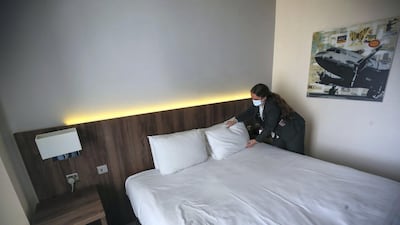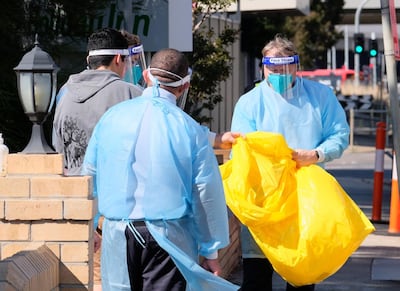The UK’s hotel quarantine system has been criticised as “very risky” after details emerged of how the scheme will operate.
The official requirements for hotel operators show the system will be less stringent than Australia’s in several ways.
The rules state guests will be allowed to leave their rooms with security guards to go outside for fresh air. Travellers arriving in Australia are not allowed to leave their rooms.
According to the guidance obtained by the BBC, UK security staff will not be tested for Covid-19 on a daily basis.
In Australia, hotel security guards are tested every day, even on their days off.
Other differences between the two systems surround the timing of meals and face masks.
UK hotels have not been given guidance on the staggered delivery of meals to guests, potentially leading to cross-infection if doors are opened at the same time. Guests are only required to wear standard surgical masks instead of the more effective FFP2 masks.
Prof Michael Toole, from the Burnet Institute in Melbourne, said the UK was taking a chance by allowing travellers to leave their rooms.
"We've learnt that that is a very risky procedure," he told BBC's Radio 4 Today programme.
His remarks came on the same day as Melbourne was plunged into a snap five-day lockdown after a Covid-19 outbreak was linked to a quarantine hotel.
Prof Toole said there had been previous cases recorded in the city after a hotel guest opened their room door and the “fog of virus went out into the corridor, travelled down and infected hotel staff”.
Lachlan Leeming, a former UK resident who went through hotel quarantine in Australia, said Britain’s system appeared less stringent in comparison.
"When you get off the plane (in Australia) you're greeted by a mix of police, army and health workers, whisked on to a bus, straight into processing and into a hotel room for two weeks," he told The National.
“The only face-to-face contact in those two weeks comes in the form of two visits by health workers – completely covered in PPE – to administer Covid tests before you’re allowed out.
"Aside from that, the only thing you've got to look forward to to break up the monotony is the three knocks on the door each day, when breakfast, lunch and dinner are dropped off – again with no face-to-face contact."
Guests need fresh air – minister
Home Office Minister Victoria Atkins defended the UK policy, saying it was “reasonable” to allow travellers quarantining in hotels a “gulp of fresh air”.
“The hotel will, of course, be adhering to all of the very strict measures that we have in place in relation to social distancing and face masks and so on,” she said.
"But I think allowing someone a gulp of fresh air during a 10-day visit in a hotel, with all the very strict measures that we have, is reasonable – but of course we will keep these measures under review."
The UK’s hotel quarantine will apply to travellers from a so-called "red list" of 33 countries, which includes the UAE, South Africa and all of South America, and will cost £1,750 ($2,419) for one adult.
Travellers from countries on the red list can only arrive into one of five airports in England.
The government said people travelling from those countries are required to book a quarantine package before they arrive, but the booking portal was still not live with less than 72 hours until check-in on Monday.
Interior minister Priti Patel said she was confident the hotel quarantine system would be ready by next week.
“I do understand there have been problems with the testing package website, which I think was launched yesterday,” she told LBC radio.
“I've been told it was back up and running this morning so please persevere with this. This is a fresh website, clearly.”
Ms Patel announced more police would be deployed to check the reasons for passenger journeys and to help “ensure compliance of arrivals from red list countries who will be part of the mandatory quarantine scheme”.
She rejected suggestions she was disappointed that the government decided against completely shutting the UK’s borders.
“There’s a range of advice that came on board and we took that advice,” she said.


